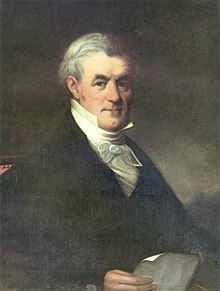
Back ويليام يوستيس Arabic ويليام يوستيس ARZ ویلیام اوستیس AZB William Eustis German William Eustis Spanish William Eustis French ויליאם יוסטיס HE William Eustis Italian ウィリアム・ユースティス Japanese Gulielmus Eustis Latin
William Eustis | |
|---|---|
 | |
| 12th Governor of Massachusetts | |
| In office May 31, 1823 – February 6, 1825 | |
| Lieutenant | |
| Preceded by | John Brooks |
| Succeeded by | Marcus Morton (acting) |
| Member of the U.S. House of Representatives from Massachusetts's 13th district | |
| In office August 21, 1820 – March 3, 1823 | |
| Preceded by | Edward Dowse |
| Succeeded by | John Reed Jr. |
| In office March 4, 1801 – March 3, 1805 | |
| Preceded by | Harrison Otis |
| Succeeded by | Josiah Quincy III |
| Constituency | 8th district (1801–03) 1st district (1803–05) |
| United States Envoy to the Netherlands | |
| In office July 20, 1815 – May 5, 1818 | |
| President | James Madison James Monroe |
| Preceded by | William Vans Murray |
| Succeeded by | Alexander H. Everett (Acting) |
| 6th United States Secretary of War | |
| In office March 7, 1809 – January 13, 1813 | |
| President | James Madison |
| Preceded by | Henry Dearborn |
| Succeeded by | John Armstrong Jr. |
| Personal details | |
| Born | June 10, 1753 Cambridge, Massachusetts Bay, British America |
| Died | February 6, 1825 (aged 71) Boston, Massachusetts, U.S. |
| Political party | Democratic-Republican |
| Spouse | Caroline Langdon |
| Education | Harvard College (BA) |
| Signature | |
| Military service | |
| Allegiance | |
| Branch/service | Continental Army |
| Years of service | 1775–1783 |
| Battles/wars | American Revolutionary War • Battles of Lexington and Concord • Battle of Bunker Hill • Siege of Boston • Shays' Rebellion |
William Eustis (June 10, 1753 – February 6, 1825) was an early American physician, politician, and statesman from Massachusetts. Trained in medicine, he served as a military surgeon during the American Revolutionary War, notably at the Battle of Bunker Hill. He resumed medical practice after the war, but soon entered politics.
After several terms in the state legislature, Eustis won election to the United States Congress in 1800, serving as a moderate Democratic-Republican. He briefly returned to state politics after losing reelection in 1804, and was chosen to be Secretary of War in 1809 by President James Madison. Due in part to his inexperience at managing the army and a lack of preparedness, the military failures in the early months of the War of 1812 were laid on his shoulders, leading to his resignation.
Madison then appointed Eustis Minister to the Netherlands, a post he held from 1814 until 1818. After another period in Congress, he was elected Governor of Massachusetts in 1822. A popular successor to long-serving John Brooks, Eustis died in office in 1825. His Boston mansion, built in the 1750s by royal governor William Shirley, is known as the Shirley-Eustis House and is a National Historic Landmark.
© MMXXIII Rich X Search. We shall prevail. All rights reserved. Rich X Search